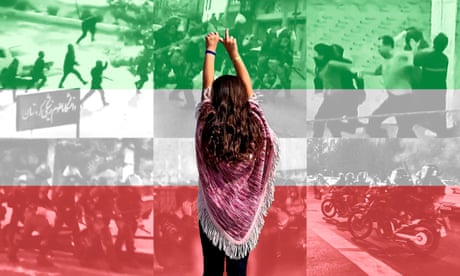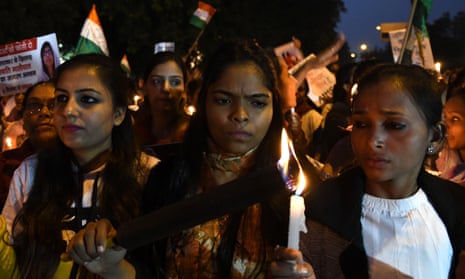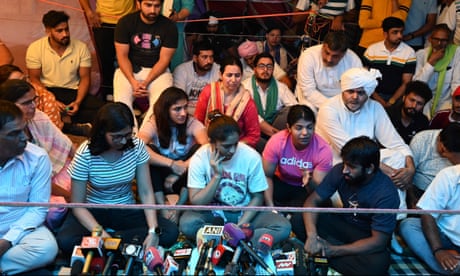‘You will be killed’: Iran’s female journalists speak out on brutal crackdown
A CRIME AGAINST HUMANITY
Ahead of a trial of journalists who covered the death of Mahsa Jina Amini, reporters describe beatings and threats as government agents try to wipe out independent media
Deepa Parent
Ahead of a trial of journalists who covered the death of Mahsa Jina Amini, reporters describe beatings and threats as government agents try to wipe out independent media
Deepa Parent
THE GUARDIAN
Tue 30 May 2023
It was a chilling warning from government agents. A young female journalist based in Tehran recounted the calls and messages she had received: “It said they were at my sister’s place and were there to rape her.”
These were the same agents from Iran’s Revolutionary Guards (IRGC) who had interrogated her after she had attended one of the nationwide protests that erupted last year after the death in custody of a 22-year-old woman, Mahsa Jina Amini, who was arrested for wearing her headscarf improperly and then reportedly beaten into a coma.
Ahead of the expected trial this week of two female journalists, who were among the first to report on the death of Amini, reporters in Iran have described the violent beatings, threats and imprisonment they have faced for reporting on protests in the country.
Speaking on condition of anonymity, a female journalist said she feared for her life, despite being released uncharged after being detained by the IRGC for three days. She had been arrested while covering protests as a reporter after Amini’s death.
“They [IRGC agents] have messaged me several times with death threats that they will kill me, like the protesters they killed during the protests,” she said.

These were the same agents from Iran’s Revolutionary Guards (IRGC) who had interrogated her after she had attended one of the nationwide protests that erupted last year after the death in custody of a 22-year-old woman, Mahsa Jina Amini, who was arrested for wearing her headscarf improperly and then reportedly beaten into a coma.
Ahead of the expected trial this week of two female journalists, who were among the first to report on the death of Amini, reporters in Iran have described the violent beatings, threats and imprisonment they have faced for reporting on protests in the country.
Speaking on condition of anonymity, a female journalist said she feared for her life, despite being released uncharged after being detained by the IRGC for three days. She had been arrested while covering protests as a reporter after Amini’s death.
“They [IRGC agents] have messaged me several times with death threats that they will kill me, like the protesters they killed during the protests,” she said.

The Iranian journalists Niloofar Hamedi, left, and Elaheh Mohammadi are among those detained. They have been accused of orchestrating protests with the CIA.
Photograph: Abaca Press/Sipa
Another female journalist said she had been told that she had “no right to cover the protests” and could not interview the families of anyone killed.
About 40% of all those journalists detained in the past seven months have been female, according to the press freedom organisation Reporters Without Borders.
The two female journalists due to go on trial this week are accused of conspiring with hostile foreign powers, a charge that potentially carries the death penalty. They have been imprisoned and held in solitary confinement since being arrested shortly after their reports appeared in September 2022.
Many citizen journalists have filled the void of official journalists who are trapped by censorship
Niloofar Hamedi, who works for the reformist newspaper Shargh Daily, and Elaheh Mohammadi, who writes on gender equality and social issues for the Hammihan newspaper, were accused of “orchestrating the nationwide protests” through their reporting, as well as being accused of working with western intelligence, especially the CIA.
Journalists in Iran say much of the brutality has been focused on citizen journalists, both male and female, whose reports and photos were seen across Iran and abroad.
Often less well-known, these citizen journalists had “filled the void of official journalists who are trapped by censorship”, a female journalist said. “Out of fear of international reaction, the Iranian government harasses well-known journalists less, but punishes anonymous citizen journalists.

‘They used our hijabs to gag us’: Iran protesters tell of rapes, beatings and torture by police
“I know many of them [citizen journalists] who were beaten in custody, and their legs were broken. All the videos and pictures published during the protests were from these citizen journalists, not official media,” said the journalist.
The dwindling number of jobs for independent journalists – as well as threats to their lives and freedom in Iran – has forced some who spoke to the Guardian to join state-run media outlets to be able to make a living. They still hope for the chance to report freely again.
“The people of Iran are more aware and wiser than ever but, with all the wealth and weapons in the hands of the dictator, how will Iranians fight against this authoritarian regime?” the journalist said. “Sometimes I think of leaving Iran, but who will then help voices to be heard?”
Another female journalist said she had been told that she had “no right to cover the protests” and could not interview the families of anyone killed.
About 40% of all those journalists detained in the past seven months have been female, according to the press freedom organisation Reporters Without Borders.
The two female journalists due to go on trial this week are accused of conspiring with hostile foreign powers, a charge that potentially carries the death penalty. They have been imprisoned and held in solitary confinement since being arrested shortly after their reports appeared in September 2022.
Many citizen journalists have filled the void of official journalists who are trapped by censorship
Niloofar Hamedi, who works for the reformist newspaper Shargh Daily, and Elaheh Mohammadi, who writes on gender equality and social issues for the Hammihan newspaper, were accused of “orchestrating the nationwide protests” through their reporting, as well as being accused of working with western intelligence, especially the CIA.
Journalists in Iran say much of the brutality has been focused on citizen journalists, both male and female, whose reports and photos were seen across Iran and abroad.
Often less well-known, these citizen journalists had “filled the void of official journalists who are trapped by censorship”, a female journalist said. “Out of fear of international reaction, the Iranian government harasses well-known journalists less, but punishes anonymous citizen journalists.

‘They used our hijabs to gag us’: Iran protesters tell of rapes, beatings and torture by police
“I know many of them [citizen journalists] who were beaten in custody, and their legs were broken. All the videos and pictures published during the protests were from these citizen journalists, not official media,” said the journalist.
The dwindling number of jobs for independent journalists – as well as threats to their lives and freedom in Iran – has forced some who spoke to the Guardian to join state-run media outlets to be able to make a living. They still hope for the chance to report freely again.
“The people of Iran are more aware and wiser than ever but, with all the wealth and weapons in the hands of the dictator, how will Iranians fight against this authoritarian regime?” the journalist said. “Sometimes I think of leaving Iran, but who will then help voices to be heard?”
Outrage in India after teenage girl killed in Delhi street
 Protesters take part in a candlelight march to campaign for an end to violence against women in New Delhi, India. Photograph: EPA
Protesters take part in a candlelight march to campaign for an end to violence against women in New Delhi, India. Photograph: EPA
Body of teenager lay untouched until police informant passed by, raising fresh concerns about women’s safety
Hannah Ellis-Petersen in Delhi
 Protesters take part in a candlelight march to campaign for an end to violence against women in New Delhi, India. Photograph: EPA
Protesters take part in a candlelight march to campaign for an end to violence against women in New Delhi, India. Photograph: EPABody of teenager lay untouched until police informant passed by, raising fresh concerns about women’s safety
Hannah Ellis-Petersen in Delhi
THE GUARDIAN
Wed 31 May 2023
The killing of a 16-year-old girl in Delhi who was stabbed and bludgeoned to death in an alley as pedestrians walked on has sparked outrage over the safety of women in India.
CCTV footage of the incident shows the teenager was accosted in public by a man, alleged by police to be 20-year-old Sahil Khan, who stabbed her more than 30 times and hit her with a concrete slab.
Several bystanders encountered the incident and though one man attempted to intervene and was violently rebuffed by the attacker, nothing else was done to stop him. No one called the police and after the killing her body lay in the alleyway untouched until it was spotted by a police informant about 30 minutes later.
According to police, Khan had been in a relationship with the girl and had decided to kill her after she tried to end it. He had allegedly used a knife bought two weeks previously, and had followed her from the market to the dark alley, where he attacked her.
“Sahil told us she humiliated him and passed objectionable comments about their relationship. This angered him and he decided to eliminate her,” a police officer told local media.
The attack prompted outrage from activists and politicians who demanded that more be done to protect women in the capital. Delhi’s chief minister, Arvind Kejriwal, said on Twitter: “A minor girl is brutally murdered openly in Delhi. This is very sad and unfortunate. The criminals have become fearless, and there is no fear of the police.”

India’s female wrestlers threaten to hand back Olympic medals in harassment row
Swati Maliwal, from the Delhi Commission for Women, said the capital had become “extremely unsafe” for girls and women and that she had “never seen anything more horrifying than this in my career of so many years”.
“There were so many people when the murder took place, but no one helped the girl. Even if they would have shouted, maybe the girl could have survived,” said Maliwal.
The incident once again raised the issue of women’s safety in India, particularly at the hands of their partners. In November, there was similar outrage after a 28-year-old man was accused of chopping up his girlfriend, Shraddha Walker, into 35 pieces and disposing of her in a forest.
National statistics suggest the problem of violence against women is showing no signs of abating in India’s deeply patriarchal society. Delhi is regularly ranked as the most dangerous city for women in India, and between 2020 and 2021, there was a 40% increase in crimes against women, according to the National Crime Records Bureau.
The killing of a 16-year-old girl in Delhi who was stabbed and bludgeoned to death in an alley as pedestrians walked on has sparked outrage over the safety of women in India.
CCTV footage of the incident shows the teenager was accosted in public by a man, alleged by police to be 20-year-old Sahil Khan, who stabbed her more than 30 times and hit her with a concrete slab.
Several bystanders encountered the incident and though one man attempted to intervene and was violently rebuffed by the attacker, nothing else was done to stop him. No one called the police and after the killing her body lay in the alleyway untouched until it was spotted by a police informant about 30 minutes later.
According to police, Khan had been in a relationship with the girl and had decided to kill her after she tried to end it. He had allegedly used a knife bought two weeks previously, and had followed her from the market to the dark alley, where he attacked her.
“Sahil told us she humiliated him and passed objectionable comments about their relationship. This angered him and he decided to eliminate her,” a police officer told local media.
The attack prompted outrage from activists and politicians who demanded that more be done to protect women in the capital. Delhi’s chief minister, Arvind Kejriwal, said on Twitter: “A minor girl is brutally murdered openly in Delhi. This is very sad and unfortunate. The criminals have become fearless, and there is no fear of the police.”

India’s female wrestlers threaten to hand back Olympic medals in harassment row
Swati Maliwal, from the Delhi Commission for Women, said the capital had become “extremely unsafe” for girls and women and that she had “never seen anything more horrifying than this in my career of so many years”.
“There were so many people when the murder took place, but no one helped the girl. Even if they would have shouted, maybe the girl could have survived,” said Maliwal.
The incident once again raised the issue of women’s safety in India, particularly at the hands of their partners. In November, there was similar outrage after a 28-year-old man was accused of chopping up his girlfriend, Shraddha Walker, into 35 pieces and disposing of her in a forest.
National statistics suggest the problem of violence against women is showing no signs of abating in India’s deeply patriarchal society. Delhi is regularly ranked as the most dangerous city for women in India, and between 2020 and 2021, there was a 40% increase in crimes against women, according to the National Crime Records Bureau.
No comments:
Post a Comment